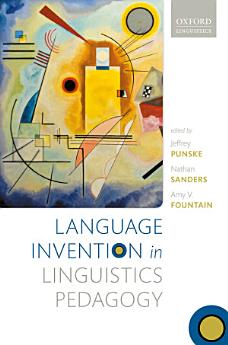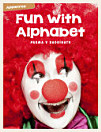Language Invention in Linguistics Pedagogy
Jeffrey Punske · Nathan Sanders · Amy V. Fountain
আগ ২০২০ · Oxford University Press
৫.০star
১ টা পৰ্যালোচনাreport
ইবুক
320
পৃষ্ঠা
family_home
যোগ্য
info
reportমূল্যাংকন আৰু পৰ্যালোচনা সত্যাপন কৰা হোৱা নাই অধিক জানক
এই ইবুকখনৰ বিষয়ে
This book is the first to explore the varied ways in which invented languages can be used to teach languages and linguistics in university courses. There has long been interest in invented languages, also known as constructed languages or conlangs, both in the political arena (as with Esperanto) and in the world of literature and science fiction and fantasy media - Tolkien's Quenya and Sindarin, Dothraki in Game of Thrones, and Klingon in the Star Trek franchise, among many others. Linguists have recently served as language creators or consultants for film and television, with notable examples including Jessica Coons work on the film Arrival Christine Schreyers Kryptonian for Man of Steel, David Adgers contributions to the series Beowulf, and David J. Peterson's numerous languages for Game of Thrones and other franchises. The chapters in this volume show how the use of invented languages as a teaching tool can reach a student population who might not otherwise be interested in studying linguistics, as well as helping those students to develop the fundamental core skills of linguistic analysis. Invented languages encourage problem-based and active learning; they shed light on the nature of linguistic diversity and implicational universals; and they provide insights into the complex interplay of linguistic patterns and social, environmental, and historical processes. The volume brings together renowned scholars and junior researchers who have used language invention and constructed languages to achieve a range of pedagogical objectives. It will be of interest to graduate students and teachers of linguistics and those in related areas such as anthropology and psychology.
মূল্যাংকন আৰু পৰ্যালোচনাসমূহ
৫.০
১ টা পৰ্যালোচনা
লিখকৰ বিষয়ে
Jeffrey Punske is Assistant Professor in the Department of Linguistics at Southern Illinois University. His primary research focus is in morphosyntax with a secondary specialization in linguistics pedagogy and outreach. He has presented on issues of language at workshops hosted by the European Space Agency and METI and works to cross disciplinary boundaries and to advance the methodologies and discourses around linguistic pedagogy and outreach. Nathan Sanders is Assistant Professor, Teaching Stream, at the Department of Linguistics, University of Toronto. He works on innovations in linguistics pedagogy and on addressing equity, diversity, and inclusion in the linguistics classroom. His linguistic research centers on biomechanics and perception, for both speech and sign languages. He also works on phonological theory, computational and statistical models of linguistic phenomena, language change, and linguistic typology. Amy V. Fountain is Associate Professor, Career Track, in the Department of Linguistics at the University of Arizona. She has taught introductory linguistics and a range of other courses at the University of Arizona since 2004. Her research focuses on language reclamation, revitalization, and endangerment, particularly with reference to Native American languages; she is also interested in prosodic phonology and the relationship between morphology and phonology.
এই ইবুকখনক মূল্যাংকন কৰক
আমাক আপোনাৰ মতামত জনাওক।
পঢ়াৰ নির্দেশাৱলী
স্মাৰ্টফ’ন আৰু টেবলেট
Android আৰু iPad/iPhoneৰ বাবে Google Play Books এপটো ইনষ্টল কৰক। ই স্বয়ংক্রিয়ভাৱে আপোনাৰ একাউণ্টৰ সৈতে ছিংক হয় আৰু আপুনি য'তে নাথাকক ত'তেই কোনো অডিঅ'বুক অনলাইন বা অফলাইনত শুনিবলৈ সুবিধা দিয়ে।
লেপটপ আৰু কম্পিউটাৰ
আপুনি কম্পিউটাৰৰ ৱেব ব্রাউজাৰ ব্যৱহাৰ কৰি Google Playত কিনা অডিঅ'বুকসমূহ শুনিব পাৰে।
ই-ৰীডাৰ আৰু অন্য ডিভাইচ
Kobo eReadersৰ দৰে ই-চিয়াঁহীৰ ডিভাইচসমূহত পঢ়িবলৈ, আপুনি এটা ফাইল ডাউনল’ড কৰি সেইটো আপোনাৰ ডিভাইচলৈ স্থানান্তৰণ কৰিব লাগিব। সমৰ্থিত ই-ৰিডাৰলৈ ফাইলটো কেনেকৈ স্থানান্তৰ কৰিব জানিবলৈ সহায় কেন্দ্ৰত থকা সবিশেষ নিৰ্দেশাৱলী চাওক।





